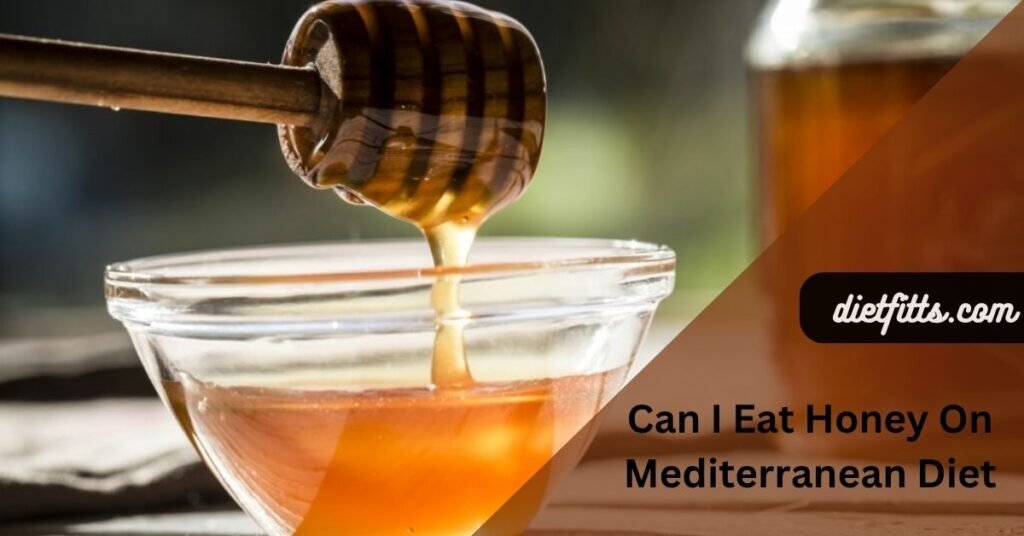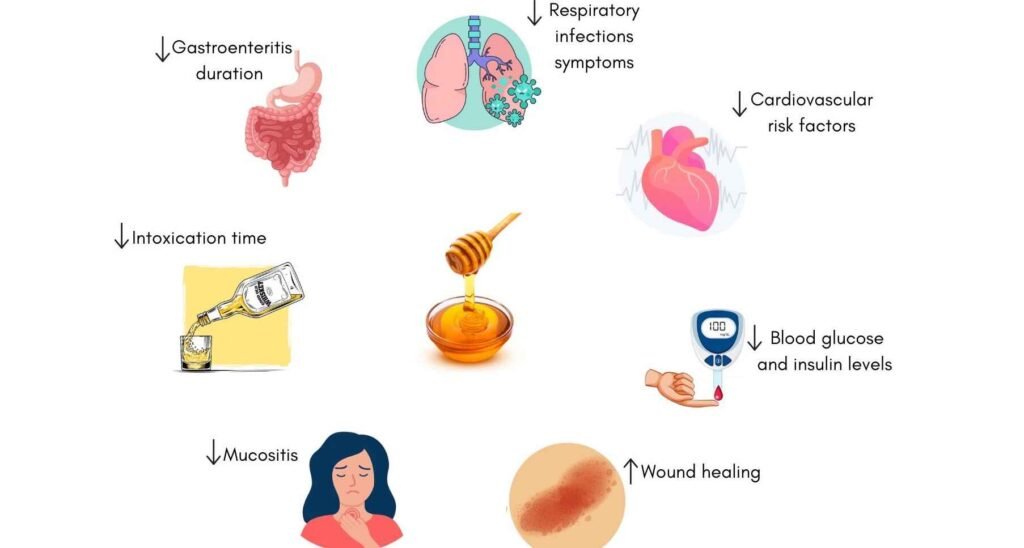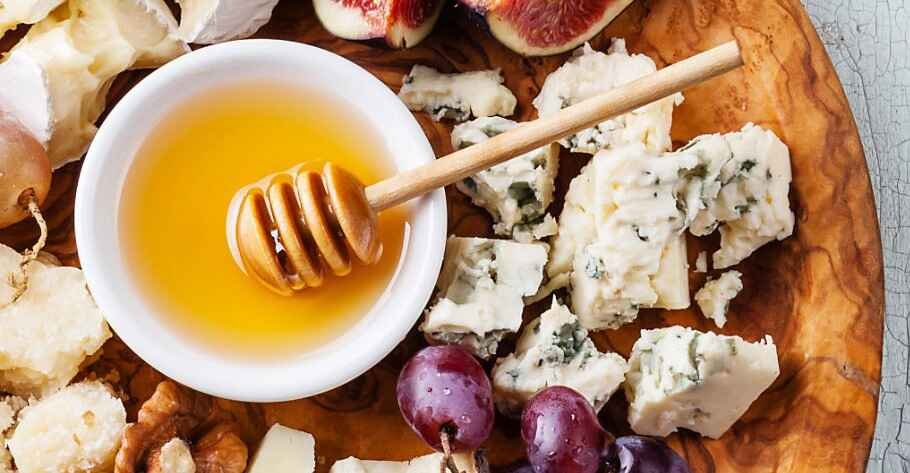Can I Eat Honey On Mediterranean Diet? – Unlocking Sweet Secrets!

When we think of a “diet,” we often think of strict rules, especially when it’s sugar-free. But the Mediterranean diet is different. It’s not about avoiding sugar altogether but eating more whole foods like fruits, veggies, and natural sweeteners.
Yes, you can. Honey is a natural sweetener that fits well with the diet’s focus on whole, unprocessed foods but in moderation. However, it enhances flavour, promotes heart health, provides energy, and has many other benefits.
In this article, you’ll check out one of this year’s trendy diets and see how honey fits perfectly.
Table of Contents:
Honey And The Mediterranean Diet – Must Consider It!
The Mediterranean diet is famous for keeping us healthy, and honey is natural. So, honey and the Mediterranean diet is a perfect match. Honey has been used in Mediterranean cooking for a long time, not only because it’s sweet but also because it’s good for us.
There are many types of honey because of the different plants in the area. Honey goes well with this diet because it includes many fresh fruits, fish, and grains—commonly eaten in the Mediterranean, where honey is often used as a sweetener.

In many recipes, sugar can be swapped for natural sweeteners like maple syrup, honey, and agave syrup. If you usually sweeten your coffee with sugar daily, try using less sugar until you no longer need it to enjoy it.
Greek honey is a beneficial natural sweetener in Greece. It’s used in many different foods in the Mediterranean diet, like desserts, teas, salads, and main dishes. Whether it’s breakfast, lunch, or dinner, Greek honey is always a tasty addition.
Health Benefits Of Honey – Let’s Discover Today!
- Nutrient-Rich: Honey contains various vitamins, minerals, zinc, iron, and many antioxidants, such as vitamin C, calcium, and flavonoids, which support overall health and well-being.
- Antioxidant Properties: Honey’s antioxidants help reduce inflammation, fight oxidative stress, and lower the risk of chronic diseases like heart disease and cancer.
- Weight Management: While honey is sweet, it has a lower glycemic index than refined sugars, meaning it causes a slower and steadier rise in blood sugar levels. However, Consuming honey in moderation can help control appetite and promote weight management.
- Energy Source: As a natural source of carbohydrates, honey provides a quick energy boost, making it a convenient option for active individuals following the Mediterranean lifestyle.
- Heart Health: Studies suggest that regular consumption of honey may help lower LDL (bad) cholesterol levels and reduce the risk of cardiovascular diseases.

Personally, I made an effort to eliminate artificial sweeteners and switch to natural ones like honey, and I have gained the benefits.
How To Use Honey In Different Ways? – Try It Now!
| Category | Uses |
| Vegetables | Honey can enhance the taste of bitter vegetables like asparagus and broccoli. |
| Adding honey to salad dressings can enhance the flavour of salads with greens like kale and spinach. | |
| Incorporating honey into low-fat dips makes eating more veggies easier for kids and adults. | |
| Glazing sweet vegetables like carrots and butternut squash with honey add flavour. | |
| Fruits | A touch of honey can make fruit salads sweeter. |
| Adding honey to smoothies with fruits and Greek yoghurt adds sweetness. | |
| Whole Grains | Enjoy whole-grain toast with almond butter and honey. |
| Mixing honey into salad dressings for whole-grain salads adds flavor. | |
| Substitute honey for sugar in baked goods made with whole grains. | |
| Mixing honey into salad dressings for whole-grain salads adds flavour. |

Other Natural Sweeteners Instead Of Honey – Try All Of Them As Well!
- Maple Syrup: A natural sweetener with antioxidants and minerals commonly used in moderation. It contains approximately 52 calories per tablespoon (20 grams).
- Date Syrup: Made from dates, it adds a rich, caramel-like sweetness and is packed with nutrients. It has approximately 55 to 60 calories per tablespoon (20 grams).
- Fruits: Fresh fruits like figs, berries, and grapes are often used to sweeten dishes and desserts naturally.
- Stevia: A plant-based, zero-calorie sweetener, sometimes used in Mediterranean cooking for its sweetness without adding sugar.
- Sorghum Syrup: You can also use sorghum syrup occasionally to change the pace.
Note: These natural sweeteners focus on whole, natural foods but must be enjoyed in moderation.
Understanding The Limitations Of Can I Eat Honey On Mediterranean Diet? – Explore The Facts!
- It has a Natural Sweetener: Honey, in its pure form, can serve as a natural alternative to refined sugars, adding sweetness to dishes without compromising nutritional integrity.
- You must use honey in limited quantity: While honey boasts health-promoting properties like antibacterial and antioxidant effects, excessive consumption can contribute to calorie overload and spike blood sugar levels.
- Must maintain a Balanced Approach: You can use honey in small amounts to add flavour to recipes or drizzle it over Greek yoghurt and fruit. This way, you can enjoy its benefits without compromising its actual value.
That is all! You’ve got all the information about “Can I Eat Honey On Mediterranean Diet”. For more information, please visit the community website.
Frequently Asked Questions
1. What is the best honey used in the Mediterranean diet?
Greek honey is beneficial. It’s used in many different foods in the Mediterranean diet, like desserts, teas, salads, and main dishes. You can have it any time of day, whether it’s breakfast, lunch, or dinner.
2. Can honey replace sugar in Mediterranean recipes?
Yes, honey can substitute sugar in many Mediterranean recipes, adding a distinct flavour profile and enhancing nutritional value. However, it’s essential to adjust quantities accordingly to maintain flavour balance.
3. Is honey consumption linked to heart health on the Mediterranean diet?
Yes, honey can be part of a heart-healthy Mediterranean diet thanks to its antioxidant properties and potential to lower LDL cholesterol levels. However, excessive intake may negate these benefits, so moderation is crucial.
Conclusion
Yes, you can eat honey on the Mediterranean diet. Honey is now part of the Mediterranean diet due to its nutrients, plant compounds, and antioxidants. However, Greek honey adds versatility to Mediterranean dishes, enhancing desserts and main courses.

Hi! I’m Olivia Steeve, a certified nutritionist with over 11 years of experience in the field of diet and nutrition. At DietFitts, I focus on providing scientifically-backed, practical advice to help individuals achieve their health and fitness goals through balanced eating. I share insights, tips, and personalized guidance to help you make healthier choices and live your best life.








